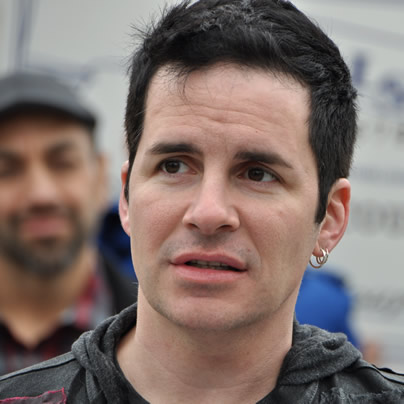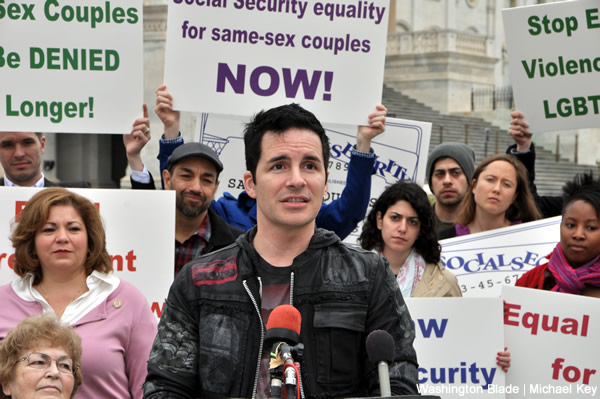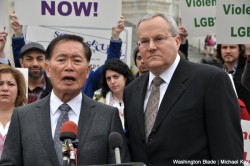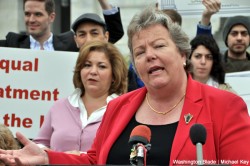National
Hollywood comes to Capitol Hill to push for Social Security bill
Legislation would allow gay couples to access benefits

A Los Angeles congresswoman beamed in support from Hollywood on Thursday to spread the word about legislation she introduced in the U.S. House to end inequities that same-sex couples face in the Social Security system.
During a news conference on Capitol Hill, Rep. Linda Sánchez (D-Calif.) said her legislation, the Social Security Equality Act, would allow gay families to gain access to the same survivor and pension benefits available to opposite-sex couples.
“The gay and lesbian population will not be told by their government that they are second-class citizens,” Sánchez said. “Same-sex couples pay into Social Security — they should receive the full benefits they have earned.”
Sánchez’s bill, H.R. 4609, would eliminate the Social Security Administration policy denying same-sex couples benefits. According to Sánchez, gay male couples receive 18 percent less in Social Security benefits than straight couples, while lesbian couples receive 31 percent less because women statistically earn less money.
Four types of Social Security benefits are denied to same-sex couples: spousal retirement benefits after one spouse retires; disability benefits if one spouse becomes disabled; survivor’s benefits, which allow surviving spouses to claim either their own Social Security benefit or an amount equal to the compensation that would have been afforded to their deceased spouse; and the death benefit, which provides for burial expenses.
The legislation, which was previously introduced in 2010, has 95 co-sponsors: all Democrats. The four openly gay members of Congress — Reps. Barney Frank (D-Mass.), Tammy Baldwin (D-Wis.), Jared Polis (D-Colo.) and David Cicilline (D-R.I.) — have all signed on in support.
Celebrities appeared at the news conference to advocate for the legislation alongside the lawmakers and LGBT advocates. Supporters carried signs reading “Outlaw Social Security Discrimination” and “Stop Economic Violence Against LGBT Seniors.” One sign was a mock Social Security card with “same-sex couples” written in the line allotted for a name.
George Takei, famed for his role as “Mr. Sulu” in the “Star Trek” series, appeared with his spouse, Brad Altman, and decried the hardship that same-sex couples face because of inequities in the Social Security system as “unfair and unjust.”
“There are same-sex couples who are denied equality often when misfortune befalls same-sex couples,” Takei said. “One falls ill, or tragically one might pass away. A survivor is left not only grieving, but financially insecure — and often the home they’ve built together, shared together is lost.”
Hal Sparks, known for his role as “Michael” in Showtime’s “Queer as Folk,” also spoke out against the current system for putting LGBT seniors in a position that is “not only emotionally difficult, but financially or physically dangerous.”
“It is odd for me, at this very moment, that as the law stands, I have rights that many of the people who are standing behind me, to my right and my left, do not have,” Sparks said. “If the law is not changed, they are headed toward a future that is more limited, more fractured and, quite frankly, more dangerous than mine.”
Another speaker at the event felt the discrimination under the current Social Security system firsthand. Alice Herman, from Los Angeles, a spokesperson for the grassroots group “Rock for Equality,” talked about the difficulties she faced after losing Sylvia, her partner of 45 years.
Even though both had paid into Social Security for more than 50 years, Herman at the age of 73 wasn’t able to receive survivor benefits following the death of her partner, who had a greater income. While Herman was a social worker, her partner worked in business and climbed the corporate ladder.
“When she died, much to my amazement, Social Security denied me the death benefit, then Social Security refused to provide me with the survivor’s benefit,” Herman said. “These denials came even though we were legally married. They dismissed our 45 together, our 45 years of love and commitment, our 45 years of contributing to society as meaningless.”
Had she been able to receive these benefits, Herman said she would have been able to stay in her home. However, she was forced to find another place to live because the only other option would be living in her car.
LGBT advocates also railed against the Social Security system for not providing gay couples the same benefits as others.
Lorri Jean, CEO of the L.A. Gay & Lesbian Center, said same-sex couples pay into Social Security with every paycheck, but are unable to reap the full benefits of the system.
“Every single month, the L.A. Gay & Lesbian Center provides programs and services to thousands of lesbian, gay, bisexual and transgender seniors,” Jean said. “Too many come because they have been denied Social Security benefits.”
Rea Carey, executive director of the National Gay & Lesbian Task Force, commended Sanchez for introducing the legislation and emphasized Social Security’s effectiveness at being “one of the most successful anti-poverty programs in the nation’s history.”
“The Social Security Equality Act begins to give same-sex couples the dignity they deserve and the financial security they desperately need,” Carey said. “In a time of flat income for most Americans and disappearing pensions, it is absolutely vital for the government to protect our most vulnerable.”
Michael Adams, executive director of Services & Advocacy for GLBT Elders, or SAGE, also stressed the need for the bill as a way to help LGBT elders.
“Whether it’s our LGBT community or our community as a whole, our elders are our pioneers,” Adams said. “They are the people who led the way for us, and the fact that in 2012, we are still having this argument over whether LGBT elders would be treated with dignity and respect and tolerance is outrageous.”
Adams said most seniors rely on Social Security for at least half of their retirement income, and LGBT elders need Social Security even more because they’re more likely to be living in poverty than opposite-sex couples. Additionally, Adams said LGBT elders are more likely to live single in their old age, and one-third of single elders rely on Social Security for their entire retirement income.
Despite the push by advocates, movement in the Republican-controlled House is unlikely. Nonetheless, Sánchez said she’s hopeful the legislation will receive a hearing in the House Ways & Means Committee, which will have jurisdiction over the bill.
Sánchez said she hasn’t had the opportunity to have a conversation with Chairman Dave Camp (R-Mich.) about the bill because it has just been introduced, but said “that conversation will be taking place in the near future.” The Ways & Means Committee didn’t respond to a request for comment on the measure.
The legislation is being introduced relatively late in the 112th Congress compared to other LGBT bills, which were introduced at the start of last year. Sánchez said the bill was being introduced at this time because “there were certain legislative nuances to the bill that we had to work out.”
Advocates at the news conference also said talks were underway about a Senate companion, although no one would identify any potential Senate sponsors or give an estimate on when the legislation would be introduced.
It’s unclear whether the bill would be necessary if the Defense of Marriage Act, which prohibits federal recognition of same-sex couples, were overturned, or if further revision would be needed after DOMA is lifted to ensure same-sex couples are eligible for Social Security benefits.
Sánchez said she wants to push for DOMA repeal as she advocates for the Social Security Equality Act.
“Ultimately, DOMA is an issue that we have to deal with, and the preferable route would be to repeal DOMA,” Sánchez said. “But this is one step we can make on the path to making that happen and we’re hoping that if we get the support that we need and the grassroots to have this legislation pass — because it’s such a clear case of economic discrimination — then that undermines the arguments in DOMA.”
Jean talked about the need to overturn DOMA at the same time she pushed for passage of the new legislation.
“Of course, we still need to repeal the Defense of Marriage Act and ensure that same-sex couples are given all of the rights that are straight brothers and sisters enjoy,” Jean said. “But until that day, the Social Security Equality Act will make a crucial difference to countless elderly people.”

Texas state Rep. James Talarico won a hard-fought primary Tuesday to become the state’s Democratic nominee for U.S. Senate, defeating U.S. Rep. Jasmine Crockett in one of the year’s most closely watched and competitive Democratic contests.
Talarico, a Presbyterian seminarian and three-term lawmaker from Round Rock, was declared the winner by the Associated Press early Wednesday morning after a closely tracked vote count that drew national attention.
“Tonight, the people of our state gave this country a little bit of hope,” Talarico told the AP. “And a little bit of hope is a dangerous thing.”
With 52.8% of the vote to Crockett’s 45.9%, Talarico secured the nomination outright, avoiding a runoff and capping months of sharp contrasts between the two candidates over strategy, messaging, and how best to compete statewide in Texas. Democrats hope the competitive primary — and the relatively narrow margin — signals growing momentum in a state that has not elected a Democrat to the U.S. Senate since 1988.
Talarico has long expressed support for the LGBTQ community, a position he highlights prominently on his campaign website. Under the “Issues” section, he directly addresses assumptions that might arise from his faith and background as a seminarian in a deeply conservative state.
“My faith in Jesus leads me to reject Christian Nationalism and commit myself to the project of democracy,” his website reads. “Because that’s the promise of America: a democracy where every person and every family — regardless of religion, race, gender, sexual orientation, or any other difference between us — can truly be free and live up to their full potential.”
Crockett struck a conciliatory tone following her defeat, emphasizing party unity ahead of November.
“This morning I called James and congratulated him on becoming the Senate nominee,” Crockett told Politico. “Texas is primed to turn blue and we must remain united because this is bigger than any one person. This is about the future of all 30 million Texans and getting America back on track.”
Talarico also drew national attention earlier in the race when “Late Show” host Stephen Colbert said he was initially unable to air an interview with the state legislator due to potential FCC concerns involving CBS. The episode sparked a broader political debate.
Brendan Carr, chair of the Federal Communications Commission, appointed by President Donald Trump, told reporters the controversy was a “hoax,” though he also acknowledged Talarico’s ability to harness the moment to build support as an underdog candidate. The interview was later released online and garnered millions of views, boosting Talarico’s national profile.
In November, Talarico will face the winner of the Republican primary between incumbent Sen. John Cornyn and Texas Attorney General Ken Paxton, who have been locked in a bruising GOP contest. Rep. Wesley Hunt was also in the Republican primary field. The GOP race is expected to head to a May runoff.
In a joint statement, Senate Minority Leader Chuck Schumer and Democratic Senatorial Campaign Committee Chair Kirsten Gillibrand praised Talarico’s victory and framed him as a candidate capable of broad appeal.
“As an eighth-generation Texan, former middle school teacher, and Presbyterian seminarian, James will be a fighter for Texans from all walks of life and of all political stripes,” they said. “In November, Texans will elect a champion for working people: James Talarico.”
National
Peter Thiel’s expanding power — and his overlap with Jeffrey Epstein
Gay billionaire’s name appears 2,200 times in files, but no criminality alleged

There are few figures in modern politics whose reach extends across Silicon Valley, Wall Street, and Washington, D.C., as Peter Thiel’s.
A billionaire venture capitalist, Thiel built his fortune at the dawn of the internet age and has since positioned himself at the highest levels of U.S. technology, finance, and national defense infrastructure. He is best known as a co-founder of PayPal, an early investor in Facebook, and the co-founder of Palantir Technologies — a data analytics firm that maintains significant contracts with U.S., U.K., and Israeli defense and intelligence agencies.
Over the last two decades, Thiel has also built an interconnected network of investment vehicles — Clarium Capital, Founders Fund, Thiel Capital, Valar Ventures, and Mithril Capital — giving him influence over emerging technologies, political candidates, and ideological movements aligned with his worldview. Through these firms, Thiel has backed companies in artificial intelligence, defense technology, biotech, cryptocurrency, and financial services, often positioning himself early in sectors that later became central to public policy debates.
Born in Frankfurt, West Germany, in 1967, Thiel immigrated to the United States as an infant. He later attended Stanford University, earning a degree in philosophy before graduating from Stanford Law School in 1992. As an undergraduate, he founded The Stanford Review, a conservative student publication that opposed what it described as campus “political correctness.” The paper became a platform for combative and contrarian arguments that previewed themes Thiel would revisit in later essays and speeches about elite institutions, democracy, and technological stagnation.
Thiel’s professional ascent coincided with the explosive growth of the dot-com era. In 1998, he co-founded PayPal, helping pioneer digital payment systems that would become foundational to online commerce. When the company was sold to eBay in 2002 for $1.5 billion, Thiel emerged a multimillionaire and part of what would later be known as the “PayPal Mafia” — a loose but influential network of founders and early employees who went on to launch or invest in some of Silicon Valley’s most dominant firms.
In 2004, Thiel made one of the most consequential investments of his career, providing $500,000 in seed funding to Facebook, then a fledgling social network founded by Mark Zuckerberg. He became the company’s first outside investor and later served on its board. That early bet proved extraordinarily lucrative and cemented Thiel’s status as a major venture capitalist with a reputation for identifying transformative platforms before they reached scale.
The same year, he co-founded Palantir Technologies. Initially backed in part by In-Q-Tel, the CIA’s venture capital arm, Palantir developed software — including its Gotham platform — designed to help defense, intelligence, and law enforcement agencies integrate and analyze massive datasets. The company’s tools allow users to map relationships, identify patterns, and visualize complex networks across financial records, communications data, and other digital trails.
Over time, Palantir secured billions of dollars in public-sector contracts. It has worked with the U.S. Department of Defense, Immigration and Customs Enforcement, the Centers for Disease Control and Prevention, and allied governments abroad. Public reporting has documented that its global government contracts exceed $1.9 billion, including agreements with Israeli defense entities — relationships that reportedly expanded following the Oct. 7 attacks in Israel. Critics have raised concerns about civil liberties and surveillance, while supporters argue the company provides essential national security tools.
By the mid-2000s, Thiel was no longer simply a wealthy entrepreneur. He was a financier operating at the intersection of capital, advanced technology, and government — with investments embedded in some of the country’s most sensitive security systems. His political giving would later extend that influence further, including support for candidates aligned with his populist and nationalist leanings– notably Donald Trump in 2016.
As his wealth and influence expanded, so too did his proximity to other powerful — and, in some cases, controversial — figures in global finance.
Among them was Jeffrey Epstein.
Thiel’s name appears more than 2,200 times in documents released so far by the U.S. Department of Justice related to Epstein. A name appearing in legal filings does not, by itself, indicate wrongdoing. However, the extensive references illustrate that Epstein’s social and financial network intersected with elite figures in technology, academia, politics, and finance — including individuals connected to Thiel’s business and philanthropic circles.
Epstein’s legal troubles became public in 2005, when police in Palm Beach, Fla., investigated allegations that he had sexually abused a minor. In 2008, he pleaded guilty in state court to soliciting prostitution from a minor under a plea agreement that was widely criticized as unusually lenient. He served 13 months in county jail with work-release privileges and was required to register as a sex offender. Comparable federal charges can carry significantly longer sentences.
Despite that conviction, Epstein continued to maintain relationships with prominent business and political figures for years. The extent to which members of elite networks remained in contact with him after his guilty plea has been the subject of extensive scrutiny.
Documents released by the Justice Department indicate that individuals connected to Thiel’s philanthropic and investment circles communicated with Epstein after his conviction. One document shows an invitation, sent on behalf of the Thiel Foundation, for Epstein to attend a technology event in San Francisco. Additional financial records and reporting indicate that between 2015 and 2016, Epstein invested approximately $40 million in funds managed by Valar Ventures, one of Thiel’s firms. Other records reflect meetings and correspondence, at times arranged through intermediaries. Epstein also extended invitations to his Caribbean residence.
There is no evidence that Thiel was involved in Epstein’s criminal conduct. The documented interactions do, however, show numerous planned meetings between the two both in the Caribbean (where Epstein’s infamous island is located) and across the world, while also raising questions about why business relationships continued after Epstein had pleaded guilty to a sex offense involving a minor and was a registered sex offender. For critics, that continued engagement speaks to the insular nature of elite finance, where access to capital and networks can override reputational risk.
Palantir represents another overlap. In emails made public through Justice Department releases, Epstein referenced Palantir in correspondence with Ehud Barak, the former Israeli prime minister who also maintained ties to Epstein. The emails do not indicate that Epstein had operational involvement in Palantir or access to its systems, however, they show that he discussed one of Thiel’s most strategically significant companies — a firm deeply integrated into Western defense and intelligence systems — with senior political figures abroad.
Separately, Thiel’s long-running dispute with Gawker Media offers additional insight into how he has exercised power outside traditional political channels.
After Gawker published an article in 2007 that publicly identified Thiel as gay, he later secretly funded litigation brought by professional wrestler Hulk Hogan over the outlet’s publication of a sex tape. The lawsuit resulted in a $140 million judgment against Gawker, which ultimately filed for bankruptcy. Thiel later confirmed his financial backing of the case, framing it as a defense of privacy and a response to what he considered reckless media behavior.
The episode demonstrated Thiel’s willingness to deploy substantial financial resources strategically and, at times, discreetly. It also illustrated how wealth can be used to influence institutions — whether through venture capital, political donations, or litigation.
Taken together, the record does not establish criminal liability for Thiel in connection with Epstein. It does, however, situate him within a dense web of elite finance, national security contracting, political influence, and reputation management. As additional documents related to Epstein continue to emerge, that web — and the decisions made within it — remains a subject of public interest and ongoing scrutiny.
National
Supreme Court deals blow to trans student privacy protections
Under this ruling, parents are entitled to be informed about their children’s gender identity at school, regardless of state protections for student privacy.

The Supreme Court on Monday blocked a California policy that allowed teachers to withhold information about a student’s gender identity from their parents.
The policy had permitted California students to explore their gender identity at school without that information automatically being disclosed to their parents. Now, educators in the state will be required to inform parents about developments related to a student’s gender identity, depending on how the case proceeds in lower courts.
The case involves two sets of parents — identified in court filings as John and Jane Poe and John and Jane Doe — both of which say their daughters began identifying as boys at school without their knowledge, citing religious objections to gender transitioning.
The Poes say they only learned about their daughter’s gender dysphoria after she attempted suicide in eighth grade and was hospitalized. After treatment for the attempt and after being returned to school the following year, teachers continued using a male name and pronouns despite the parents’ objections, citing California law. The Poes have since placed their daughter in therapy and psychiatric care.
Similarly, the Does say their daughter has intermittently identified as a boy since fifth grade, but while their daughter was in seventh grade, they confronted school administrators over concerns that staff were using a male name and pronouns without informing them. The principal told them state law barred disclosure without the child’s consent.
Both sets of parents filed lawsuits in the U.S. District Court for the Southern District of California challenging the state policy that protects students’ gender identity and limits when schools can disclose that information to parents.
The justices voted along ideological lines, with the court’s six conservative members in the majority and the three liberal justices dissenting.
“We conclude that the parents who seek religious exemptions are likely to succeed on the merits of their Free Exercise Clause claim,” the court said in an unsigned order. “The parents who assert a free exercise claim have sincere religious beliefs about sex and gender, and they feel a religious obligation to raise their children in accordance with those beliefs. California’s policies violate those beliefs.”
In dissent, the three liberal justices argued that the case is still working its way through the lower courts and that there was no need for the high court to intervene at this stage. Justice Elena Kagan wrote, “If nothing else, this Court owes it to a sovereign State to avoid throwing over its policies in a slapdash way, if the Court can provide normal procedures. And throwing over a State’s policy is what the Court does today.”
Conservative Justices Samuel Alito and Clarence Thomas indicated they would have gone further and granted broader relief to the parents and teachers challenging the policy.
The emergency appeal from a group of teachers and parents in California followed a decision from the United States Court of Appeals for the Ninth Circuit that allowed the state’s policy to remain in effect. The appeals court had paused an order from U.S. District Judge Roger Benitez — who was nominated by George W. Bush — that sided with the parents and teachers and put the policy on hold.
The legal challenge was backed by the Thomas More Society, which relied heavily on a decision last year in which the court’s conservative majority sided with a group of religious parents seeking to opt their elementary school children out of engaging with LGBTQ-themed books in the classroom.
California Attorney General Rob Bonta expressed disappointment with the ruling. “We remain committed to ensuring a safe, welcoming school environment for all students while respecting the crucial role parents play in students’ lives,” his office said in a statement.
The decision comes as the Trump administration has taken a hardline approach to transgender rights. During his State of the Union address last week, President Donald Trump referenced Sage Blair, who previously identified as transgender and later detransitioned, describing Blair’s experience transitioning in a public school. According to the president, school employees supported Blair’s chosen gender identity and did not initially inform Blair’s parents.

Last year, the court upheld Tennessee’s ban on gender-affirming medical care for transgender minors and has allowed enforcement of a policy barring transgender people from serving in the military to continue during Trump’s second term.





















